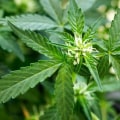THC Delta 9 is the cannabinoid that most marijuana users look for when they want to have a euphoric high and that's what most people refer to when they say “THC”.
Delta 9
binds to CB-1 receptors in the brain and can produce strong psychoactive effects such as euphoria, relaxation, talkativeness and laughter, etc. Delta-9-tetrahydrocannabinol is a partial agonist in both CB1R and CB2R. CB1R binding is primarily responsible for the psychotomimetic effects of cannabis.Binding to CB2R may have other immunological or anti-inflammatory effects. 1-delta-9-tetrahydrocannabinol can be administered in several formulations, including oral ingestion, sublingually, topically, by steam inhalation, smoked, mixed with food and drunk in tea, and research studies have also administered it intravenously. It causes several potentially negative effects, such as an increase in psychoactive symptoms, cognitive deficits and an increase in heart rate. 16 Psychoactive effects are generally related to perceptual alterations (i.e., changes in the intensity of sounds).
At higher doses and in vulnerable people, THC has been associated with the exacerbation of psychotic symptoms, such as delusions and hallucinations. In people with schizophrenia, THC causes a worsening of psychotic symptoms that are not counteracted by antipsychotic medications, 17,18 It has an anxiogenic effect that, in severe cases, causes paranoia. Binding affinity refers to the strength of the bonds between a biomolecule and an inhibitor or drug. Delta-8 THC binds to G proteins along with CB1 receptors located in the central nervous system.
Delta-9 has a high binding affinity with CB1 receptors in the central nervous system. Delta-8 and delta-9 have also shown strong binding affinity with CB2 receptors in the gastrointestinal and immune systems. THC stands for delta-9-tetrahydrocannabinol or Δ-9-tetrahydrocannabinol (Δ-9-THC). It is a cannabinoid molecule found in marijuana (cannabis) that has long been recognized as the main psychoactive ingredient, that is, the substance that makes people who use marijuana feel high.
If this is your first time consuming it, delta-8 THC may seem like the natural next step for CBD compared to trying THC right away. CBD doesn't seem to alter blood THC concentrations, but CBD may prevent THC from converting to a more psychoactive metabolite, 11-hydroxy-THC. For example, THC can bind to CB1 and CB2 receptors, but it is the specific binding of THC to CB1 receptors that causes the psychotropic effects associated with commercial marijuana. Once extracted from biomass and converted into concentrate, delta-8 THC and delta-9 THC extracts can be used to create various infused products, such as cannabis edibles, extracts, vaping cartridges, tinctures, topical products, capsules, transdermal patches and much more.
A study in 46 adults found that 600 mg of oral CBD administered 3.5 hours before intravenous THC (1.5 mg) reduced verbal memory deficits to a greater extent than placebo when administered together with THC. Delta-8 THC is popular with many cannabis users, especially those who don't have legal access to delta-9 THC. In a second phase of the study, they administered oral CBD or placebo to 6 people before administering THC intravenously on 2 different test days and found that, as in previous studies, CBD reduced the psychotomimetic effects of THC. Keep in mind that delta-9 THC is the most common cannabinoid in the cannabis plant, while delta-8 THC is found in small concentrations.
While delta-9 THC and delta-8 THC may share many health benefits, each has a different potency and a “high”. Before you jump into the delta-8 THC craze, you have to consider a chemical difference between delta-8 THC and delta-9 THC, which creates different effects. While the test participants reported no difference between feeling “high” with THC or THC + CBD, on the day of the THC test, there were more errors in facial recognition of emotions that were corrected when CBD was administered simultaneously. Research into the effects of THC (or delta-9-THC) is complicated by many factors, but there is sufficient evidence that THC can be harmful, especially for younger people whose brains are still developing.
THC is generally believed to cause acute cognitive problems, but the most stable cognitive deficits seen with the administration of THC are verbal learning deficits, specifically the inability to encode new information. They found that THC and CBD had opposite neurobiological effects on blood oxygen level-dependent responses: CBD generally showed increased activation compared to placebo and THC showed a decrease in activation compared to placebo and THC showed a decrease in activation. Delta-8 THC and delta-9 THC may have similar chemical structures, but the differences make the difference. However, when ingested, delta-8 THC is metabolized in a second step and is converted to 11-hydroxy-THC, a metabolite of THC.
.



